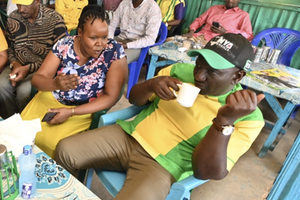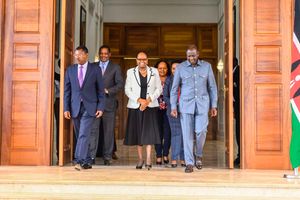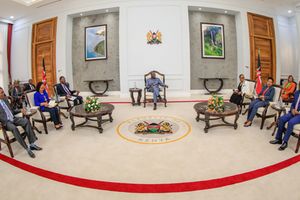
President William Ruto assents to the Supplementary Appropriation (No.3) at State House, Nairobi in November 2023.
The KK administration is gearing up for a second wave of tax increases in as many years. Away from the political spin of finding empty coffers, the regime has been increasing expenditure quite rapidly. If the current proposals are adopted by Parliament next week, those increases will total Sh1 trillion in just two years. The tax hikes are to fund those expenditures, often criticised as wasteful, and with no clear prioritization.
The 2024 Budget Policy Statement (BPS), presented to Parliament last week proposes Sh324 billion in new taxes. This is the equivalent of Sh27,000 for every working age Kenyan.
The BPS is the foundational instrument in budget making. It sets out the proposed expenditures, referred to as budget ceilings in common parlance. It also shows how they will be financed through both taxation and borrowing. The contents of the subsequent budget instruments – the debt management strategy, the finance bill and the budget estimates - are a consequence of the decisions made in the BPS.
Usually, the BPS gives indicative revenue raising measures, but the 2024 version is short on specifics. In a rather underhand maneuver, the specific taxation measures contained in the December 18, 2023 exposure draft of the BPS have now been left out of the final document. They have been replaced by general statements about taxation, such as fairness, equity, and economic efficiency.
No doubt taxation should be fair, equitable, and administratively efficient. Taxation should also not hamper economic activity, because if businesses are stifled or are failing, they cannot pay taxes. But these principles are covered in the national tax policy, and need not be repeated in the BPS.
The December exposure draft seems to have served as a sort of test balloon. Most public commentary on the specific proposals was negative. And deservingly so. Some of the proposals are, well, a step too far. Imposing VAT on education services will likely curtail access on account of cost. Withholding tax on agricultural produce, and forcing cooperatives to collect it, is completely at odds with increasing food production. While a vehicle circulation tax may encourage use of public transport in urban areas, such transport needs to be appealing and readily available.
Presenting a BPS without specific measures undermines the public and parliament’s role in budget making. A basic requirement of the Constitution and the Public Finance Management Act is to present reports, plans or estimates with sufficient detail to enable their interrogation, analysis and critique.
The document itself is presented in flowery but vague language, short on program details. While it promises agricultural transformation and inclusive growth, it only dwells on subsidised fertilizer and maize. Both are important elements of Kenyan agriculture, but you certainly cannot claim to transform the whole sector by focusing on one crop.
This fixation with fertilizer and maize is unfortunate for the sector and the republic. It means that other segments, such as livestock are neglected. Yet livestock contributes more to the economy than all the main commercial crops combined.
The 2024 BPS continues the trajectory of large budget deficits. The next financial year’s deficit is projected at Sh753.2 billion, lower than the current year’s 832.4 billion. The regime has been quick to point to this as progress.
However, the actual deficits tend to be higher than stated. This is largely the result of unrealistically high revenue targets to begin with. When the inevitable revenue shortfalls arise, the result is more borrowing. And it comes in two forms. Domestic and external borrowing from the financial markets and multilateral organisations such as World Bank and IMF, who provide budget support.
But increasingly that borrowing is informal, and unsanctioned. It comes in the form of pending bills. Public sector procurement is based on approved budgets, not cash in the bank. When revenues fall short, suppliers and contractors go unpaid. Many contracts do not have sufficient inbuilt penalties or interest for late payments. All this leaves businesses badly exposed. The actual amount of pending bills is itself somewhat of a moving target. They amounted to Sh630.6 billion by September 2023.
Second, the rhetoric masks the cumulative effect of these large budget deficits. The 2024 BPS presents a medium-term framework in which the stock of public debt will rise with about Sh4 trillion in the period to the 2027/28 financial year.
This ferocious appetite for debt by the regime was on display again last week, with the latest infrastructure bond. The regime picked up Sh240.9 billion at 18.46 per cent. Interest on these bonds is tax free, so this interest rate is equivalent to 21.7% on a taxable basis. Sh70.5 billion was used to redeem existing debt.
With government picking all the liquidity and at such high interest rates, business are gasping for air, with non-performing loans on the rise. All this makes it more unlikely for taxation to yield the desired targets.
The 2024 Budget Policy Statement firms up the trajectory that will double taxes within 5 years, from Sh2.36 trillion in the 2022/23 financial year, to Sh4.98 trillion by the 2027/28 financial year. This is an increment of 4-500 billion shillings every year.
Most disappointing is lack of program detail. From agriculture, to micro, small and medium enterprises, to manufacturing and services, it seems that the regime expects to achieve transformation by doing more of the same old thing.
@NdirituMuriithi is an economist










